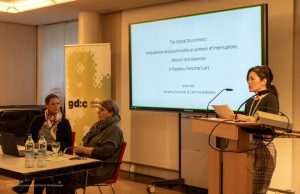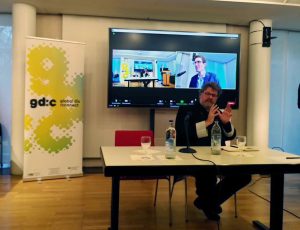In
News
 The first annual conference of global dis:connect, entitled Dis:connectivity in processes of globalisation: theories, methodologies and explorations, took place in Munich on 20-21 October. As the title indicated, the conference aimed to ground the vast field of research on global dis:connectivity by probing what theories and methodologies might be fruitful. The conference sought to start the discussion rather than to formulate definitive answers, laying the groundwork for further reflections on these issues over the coming years in conversation with our current and future fellows at the centre.
This international conference brought together different disciplines: historians, art historians, theatre scholars and others in conjunction with creative professionals from the arts, including architecture, design and theatre. The dialogue between theory and practice, each with its own distinctive approaches, induced productive friction. Artistic and philosophical approaches showed their potential to offer new modes of studying a phenomenon as complex as global dis:connectivity.
The conference featured three panels: interruptions, absences and detours. The presentations revealed how researching these modes of dis:connectivity can mean very different things. Such research can mean asking about tradition and modernity and their relation to globalisation; it meant looking at the interplay of nationalism and globalisation in societies marked by stringent national, ethnic and religious demarcations; it meant searching for connections and disconnections simultaneously in such bounded contexts such as the global interactions of the Cold War era. Many papers also looked at how individuals negotiate global connections and disconnections in their own personal biographies, revealing the affective attributions, emotions and ideological influences that make globalisation processes significant in the first place. Such research also entails recovering the agents and groups that were effaced by later hegemonic narratives. Some participants even sought to understand experiences of dis:connectivity beyond our conventional Western understandings of linear time and Euclidian space in ways that might enable more personalised modes of dealing with forced or trauma-induced immobility.
The first annual conference of global dis:connect, entitled Dis:connectivity in processes of globalisation: theories, methodologies and explorations, took place in Munich on 20-21 October. As the title indicated, the conference aimed to ground the vast field of research on global dis:connectivity by probing what theories and methodologies might be fruitful. The conference sought to start the discussion rather than to formulate definitive answers, laying the groundwork for further reflections on these issues over the coming years in conversation with our current and future fellows at the centre.
This international conference brought together different disciplines: historians, art historians, theatre scholars and others in conjunction with creative professionals from the arts, including architecture, design and theatre. The dialogue between theory and practice, each with its own distinctive approaches, induced productive friction. Artistic and philosophical approaches showed their potential to offer new modes of studying a phenomenon as complex as global dis:connectivity.
The conference featured three panels: interruptions, absences and detours. The presentations revealed how researching these modes of dis:connectivity can mean very different things. Such research can mean asking about tradition and modernity and their relation to globalisation; it meant looking at the interplay of nationalism and globalisation in societies marked by stringent national, ethnic and religious demarcations; it meant searching for connections and disconnections simultaneously in such bounded contexts such as the global interactions of the Cold War era. Many papers also looked at how individuals negotiate global connections and disconnections in their own personal biographies, revealing the affective attributions, emotions and ideological influences that make globalisation processes significant in the first place. Such research also entails recovering the agents and groups that were effaced by later hegemonic narratives. Some participants even sought to understand experiences of dis:connectivity beyond our conventional Western understandings of linear time and Euclidian space in ways that might enable more personalised modes of dealing with forced or trauma-induced immobility.
 Dis:connectivity is an expansive research object and always threatens to elude us. The papers and unconventional presentations of this conference emphasised both the need to refine the term and the extent to which unconventional methodologies and theories allow us to approach dis:connectivity.
The complexity of globalisation processes that the conference sought to explore affect our present in dramatic ways. As was highlighted in the conference’s wrap-up, seeking to better understand this complexity can tangibly affect society.
The original announcement and the full programme of the conference can be found here. Continue Reading
Dis:connectivity is an expansive research object and always threatens to elude us. The papers and unconventional presentations of this conference emphasised both the need to refine the term and the extent to which unconventional methodologies and theories allow us to approach dis:connectivity.
The complexity of globalisation processes that the conference sought to explore affect our present in dramatic ways. As was highlighted in the conference’s wrap-up, seeking to better understand this complexity can tangibly affect society.
The original announcement and the full programme of the conference can be found here. Continue Reading
Looking back at global dis:connect’s first annual conference, 20-21 october 2022 (by hanni geiger & tom menger)

@Annalena Labrenz & David Grillenberger

@Ben Kamis
21 December 2022





